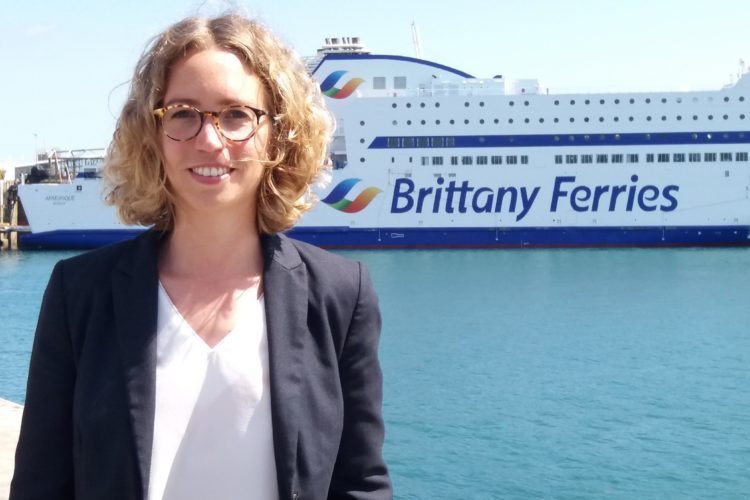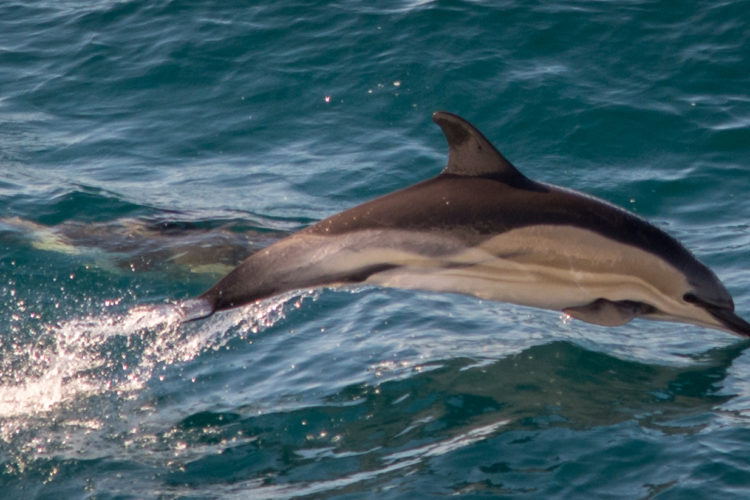Brittany Ferries appoints a green leader
Brittany Ferries has hired its first eco-responsibility manager, in a move to centralise the company’s efforts to reduce its environmental footprint. The appointment of Claire Artagnan reinforces a long-standing commitment to sustainable development across all aspects of ferry operations, from building new ships to reducing single use plastics on board.
Claire joined Brittany Ferries in March 2019. She spent six years working on the development of offshore wind farms and on smart building projects prior to joining.
“From the outset, Brittany Ferries has had a profound respect for the environment,” said Christophe Mathieu, CEO Brittany Ferries. “We were founded by the farming community in Brittany and protecting and nurturing the environments in which we operate is part of our DNA. However, Claire’s key role will be to ensure positive action is coordinated across all parts of business, from the delivery of new ships to tenders for every new contract. It’s a key role and we warmly welcome her to the Brittany Ferries family.”
Progress today
The company has already taken concrete action reduce the environmental impact of its operations today, particularly in terms of single use plastics. Many changes have been driven, for example the replacement of plastic cups in cabins with a cardboard cups, the replacement of plastic straws and stirrers on board, and the installation of battery recycling points on ships and in French terminals.
Brittany Ferries’ buyers are also in the process of sourcing bamboo cutlery to replace the limited remaining plastic cutlery used on board,. Eco-friendly shampoo/soap distributors have been installed in ensuite showers, while studies are taking place to replace soap packaging on the sinks (lavabos) with biodegradable alternatives
Looking forward
In terms of progress, Brittany Ferries has already announced significant steps towards cutting emissions from ships, through the transition to LNG (liquefied natural gas). Three new LNG ships will be delivered within the next four years, in an investment worth more than half a billion Euro. This will deliver an estimated CO2 reduction per passenger on long haul routes by 46%. Better air quality in ports will also follow, with a dramatic reduction in sulphur, nitrogen dioxide and particulate emissions.
Circular economy
The company has a strong track record on what is known as the circular economy. Eighty percent of food served on board originates in France, reducing food miles, the majority coming from Brittany. Dishes served in restaurants, for example, include vegetables supplied by Prince de Bretagne, a farming collective run by the shareholders (and farmers) of Brittany Ferries, including the company chairman Jean-Marc Roué.
Protection of marine mammals
Scientists from ORCA, a charity dedicated to monitoring and protecting marine wildlife, regularly observe marine animals’ behaviour from on board vessels. They organise public awareness campaigns during the summer and are engaged in ground-breaking research projects. This year scientists will start a ship strike study, based on observations from Brittany Ferries ships, documenting whale behaviour as a ship is approaching. The aim is to learn by observation, then make recommendations that could apply to global shipping operators anywhere in the world.
Ends.
About Brittany Ferries
In 1967 a farmer from Finistère in Brittany, Alexis Gourvennec, succeeded in bringing together a variety of organisations from the region to embark on an ambitious project: the aim was to open up the region, to improve its infrastructure and to enrich its people by turning to traditional partners such as Ireland and the UK.
In 1972 BAI (Brittany-England-Ireland) was born. The first cross-Channel link was inaugurated in January 1973, when a converted Israeli tank-carrier called Kerisnel left the port of Roscoff for Plymouth carrying trucks loaded with Breton vegetables such as cauliflowers and artichokes. The story therefore begins on 2 January 1973, 24 hours after Great Britain’s entry into the Common Market (EEC). From these humble beginnings however Brittany Ferries as the company was re-named quickly opened up to passenger transport, then became a tour operator.
Today, Brittany Ferries has established itself as the national leader in French maritime transport: an atypical leader, under private ownership, still owned by a Breton agricultural cooperative. Eighty five percent of the company’s passengers are British. Around 210,000 freight units are carried each year.
Key figures:
Turnover: Approximately €444.2m per year
Employment – Between 2400 and 3100 employees (including 1,700 seafarers), depending on the season. 360 in the UK.
Passengers: Between 2.5 and 2.7 million each year travelling in approximately 900,000 cars
Freight: 205,400 units transported annually, and one freight-only route linking Bilbao and Poole
Twelve ships operating services that connect France, the United Kingdom, Ireland and Spain
Eleven ports in total: Bilbao, Santander, Portsmouth, Poole, Plymouth, Cork, Caen, Cherbourg, Le Havre, Saint-Malo, Roscoff
Tourism in Europe: There were 854,000 unique visitors, staying 9.2 million bed-nights in France.
www.brittanyferriesnewsroom.com.
Contact:
Ellis Malcolm on 02392 892 221 or 07464 980 594 or [email protected]
Christopher Jones on 02392 152 291 or 07917 540 878 or [email protected]
Nigel Wonnacott on 02392 152 273 or 07833 446 729 or [email protected]
 News
News

